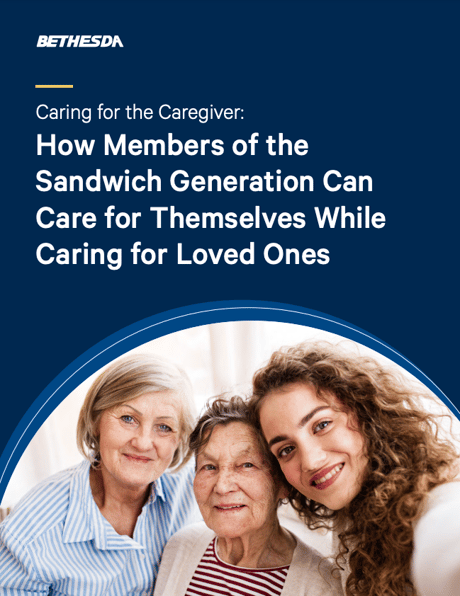Caring for the Caregiver: How Members of the Sandwich Generation Can Care for Themselves While Caring for Loved Ones
Download a PDF version of this guide by filling out this form, or keep scrolling to learn more.

Call, email, or connect with us today
Introduction

What does it mean to be in the sandwich generation? This term doesn’t refer to a specific generation, such as millennials or baby boomers.
They’re “sandwiched” between dependent parents and dependent children.
Being a sandwich generation caregiver comes with a lot of responsibilities and emotions. These individuals often provide both financial and emotional support for their parents and children or grandchildren, which can lead to several unique challenges.
Balancing caring for your parents with caring for your children is often a process that requires frequent adjustments. In the midst of providing care for those you love, it can be easy to overextend yourself and neglect self-care.
How can sandwich generation caregivers bring more balance to their responsibilities? We’re taking a look at the challenges, how to balance caregiving duties, and how to talk to your parents about sensitive topics.
Unique Challenges Adult Children in the Sandwich Generation Face

Health and Emotional Challenges
Going to work, followed by dropping the kids off at soccer practice, picking up prescriptions for your parents, and then coming home to make dinner, clean it up, and then starting this routine or a similar one the next day can cause exhaustion and emotional and physical stress. This scenario is common for many in the sandwich generation, and it can lead to health and well-being concerns, such as caregiver burnout.
Caregiver burnout is mental, physical, and emotional exhaustion that happens when someone is dedicating time and energy to providing care for others. Someone who’s experiencing burnout may have the following symptoms:
- Inability to concentrate
- Physical and emotional exhaustion
- Loss of interest in activities that were previously enjoyed
- Changes in sleep
- Irritability toward others
If you’re feeling burned out, it’s important to reach out to your health care provider to discuss your feelings and find out their recommendations for managing stress and your caregiving responsibilities. Remember to be completely honest and open about your feelings—otherwise, your provider may not be able to help you fully.

Financial Challenges
Approximately 25 percent of sandwich generation caregivers provide financial support to their parents in addition to their own children, meaning they are, in effect, supporting three generations of people at the same time. This can make finances feel tight and potentially lead to additional debt.
Many caregivers may find themselves putting off retirement or even dipping into their retirement funds to cover expenses. To manage the financial burden, it can help to try to set boundaries with parents and adult children by determining a specific amount you’ll provide for support.
Time Management Challenges
Sandwich generation caregivers are often balancing relationships and careers with caring for their senior parent(s) and children—and that’s at a minimum. Likely, there are many more things you’re trying to juggle, including housework, shopping for groceries, preparing meals, and more.
All of these responsibilities require one of the most important assets you have: time. Balancing these demands can leave you with little time for yourself. This can take a toll on your mental health and can make it difficult for you to have a social life or boundaries. It’s important to advocate for yourself and seek assistance where you can—from your spouse, other family members, or professional caregivers—so you can avoid being spread too thin.
Career Challenges
Increasing demands at home can lead to exhaustion, which can impact productivity at work. It can also impact your ability to engage in work and be present every day. As a result, the growing demands you face outside of your workplace may make you feel as though you don’t have a healthy work-life balance. To help manage your career and outside responsibilities, it’s important to be transparent with your employer about your caregiving duties. Inquire if there are flexible working arrangements available—such as remote work—to enable you to better support your family while continuing your career.
The growing demands you face outside of your workplace may make you feel as though you don’t have a healthy work-life balance.
How to Balance Caring for Your Loved Ones and Caring for Yourself

Ask for Help
You don’t have to do this alone, nor should you. Don’t be afraid to ask for help with housekeeping, meal preparation, and other chores from members of your household or friends. Taking things off of your plate can help alleviate feelings of needing to do everything on your own.
Support groups are a way for caregivers to share their experiences, words of encouragement, and ideas, and members can be a sympathetic ear for others who are experiencing challenges. Caregiver support groups may meet online or in person, depending on what you’re comfortable with. There are different types of support groups, such as those for caregivers with loved ones who have been diagnosed with cancer or other conditions, groups focused on specific caregiving situations, and more. You may need to try a few different groups before you find one you feel comfortable with, so don’t give up if the first one you try doesn’t feel like the right fit for you.
Join Caregiver Support Groups
Support groups are a way for caregivers to share their experiences, words of encouragement, and ideas, and members can be a sympathetic ear for others who are experiencing challenges.
Caregiver support groups may meet online or in person, depending on what you’re comfortable with. There are different types of support groups, such as those for caregivers with loved ones who have been diagnosed with cancer or other conditions, groups focused on specific caregiving situations, and more. You may need to try a few different groups before you find one you feel comfortable with, so don’t give up if the first one you try doesn’t feel like the right fit for you.

Make Time for Yourself
Don’t underestimate the value that participating in something you enjoy can bring. Even setting aside 15 minutes to read a book, take a walk, take a relaxing bath, call a friend, or do another self-care activity you enjoy can help you recharge.
Feelings of guilt may arise because you’re spending time on yourself instead of your loved ones, but it’s important to get past these feelings and pursue activities that fulfill you and help replenish the physical and mental energy you need to handle all of your responsibilities.
Along with these tips, it’s also important to maintain an open dialogue with your senior parent. Two-way communication plays an important role in ensuring you’re on the same page and setting boundaries for caregiving.
How to Talk to Your Parents About Sensitive Topics

It can be hard to know how to begin, and this feeling may make you feel like skipping the conversation altogether. However, it’s possible to have a positive conversation that results in a better path forward.
Here are some tips for having this conversation:
- Write notes before your conversation to remember what you want to bring
up, and keep the conversation focused on these points. - Consider what’s important, including your parents well-being, happiness,
peace of mind, and safety. - Put yourself in their shoes and consider how they may be feeling.
- Talk through your points with a friend or caregiver support group to get
feedback and ensure you’re being clear and speaking in a positive tone. - Stay calm and focused if your parents are resistant, and maybe revisit the
conversation on another day when you’re both calmer. - Remember to listen—don’t get so caught up in your own points that you
don’t allow them the space to share their own concerns and ideas.
How Bethesda Supports Caregivers

Independent living communities can help adult children enjoy more quality time with their senior parent(s) and less time managing household tasks and providing care. Additionally, your parent has everything they need within the community, including access to team members around the clock, which can lead to a better quality of life, increased energy, and reduced stress.
Bethesda’s communities and staff members prioritize the happiness and well-being of residents by providing a nurturing and safe environment that enables residents to pursue their passions, focus more on family and friends, and live the low-maintenance lifestyle they deserve.
Experience the Difference of Independent Living Communities

Download a PDF version of this guide by filling out this form.

Call, email, or connect with us today
Which Living Option is Right for You?
No matter your senior care or retirement living needs, explore a range of solutions to find the perfect fit for you.

Independent Living
Continue to live a life you enjoy without the burden of homeownership and upkeep. Empower your retirement through convenience, comfort, and community.
- Happy Hours and Social Events
- Housekeeping
- Restaurant-Style Dining

Assisted Living
For those who need a little extra help to live on their own. Lead an independent, rewarding life while still receiving the care you need.
- Personalized Daily Assistance
- Medication Management
- Engaging Events and Activities

Skilled Nursing & Rehab
When your loved one is no longer able to care for themselves or is recovering from a hospital stay, injury or illness.
- Individualized Care Plans
- 24-Hour Support and Care
- Full Calendar of Activities

Memory Support
Specialized care and support for loved ones living with Alzheimer’s Diease and other forms of dementia.
- Engaging Programs & Activities
- Compassionate and Patient Staff
- A Focus on Building Purpose and Confidence








